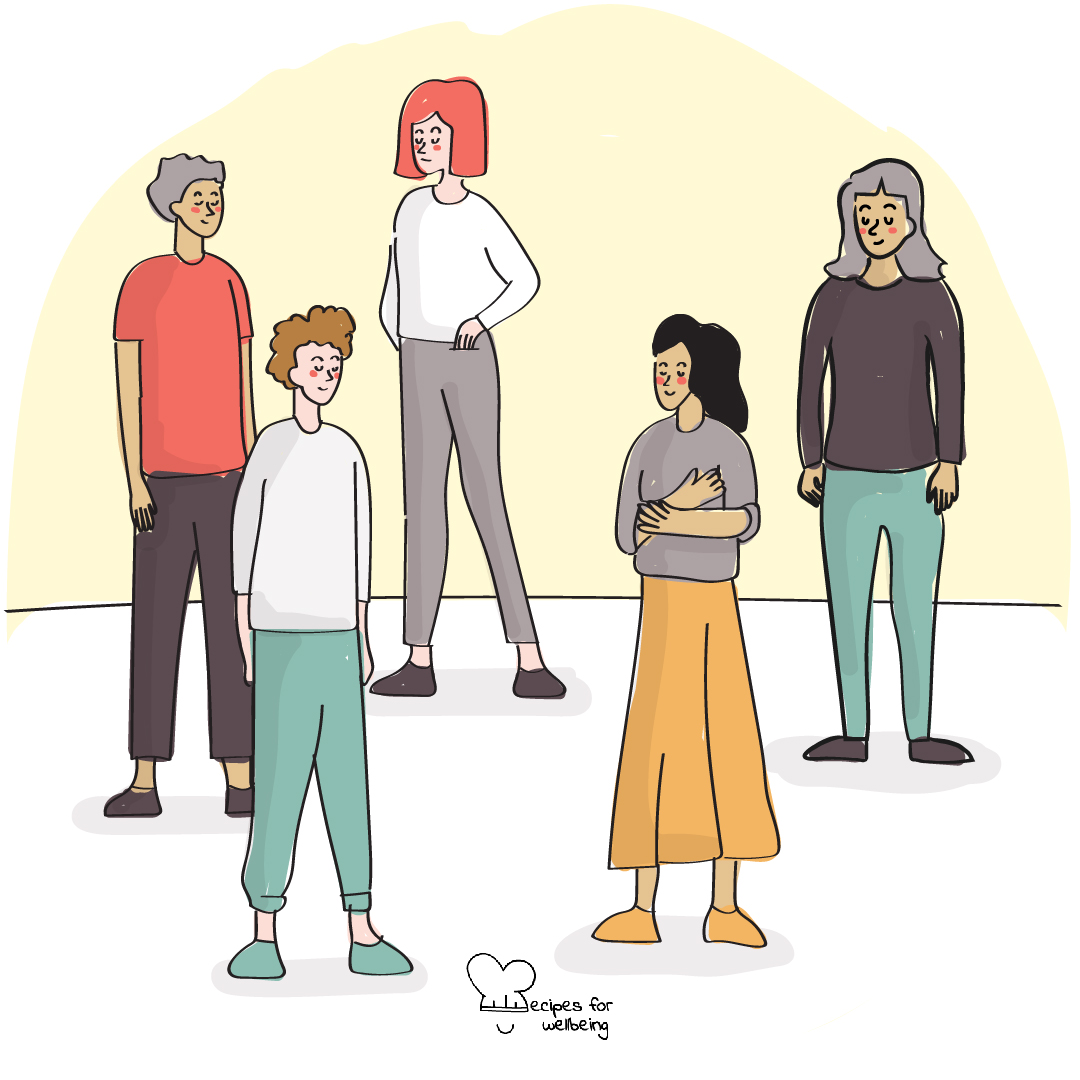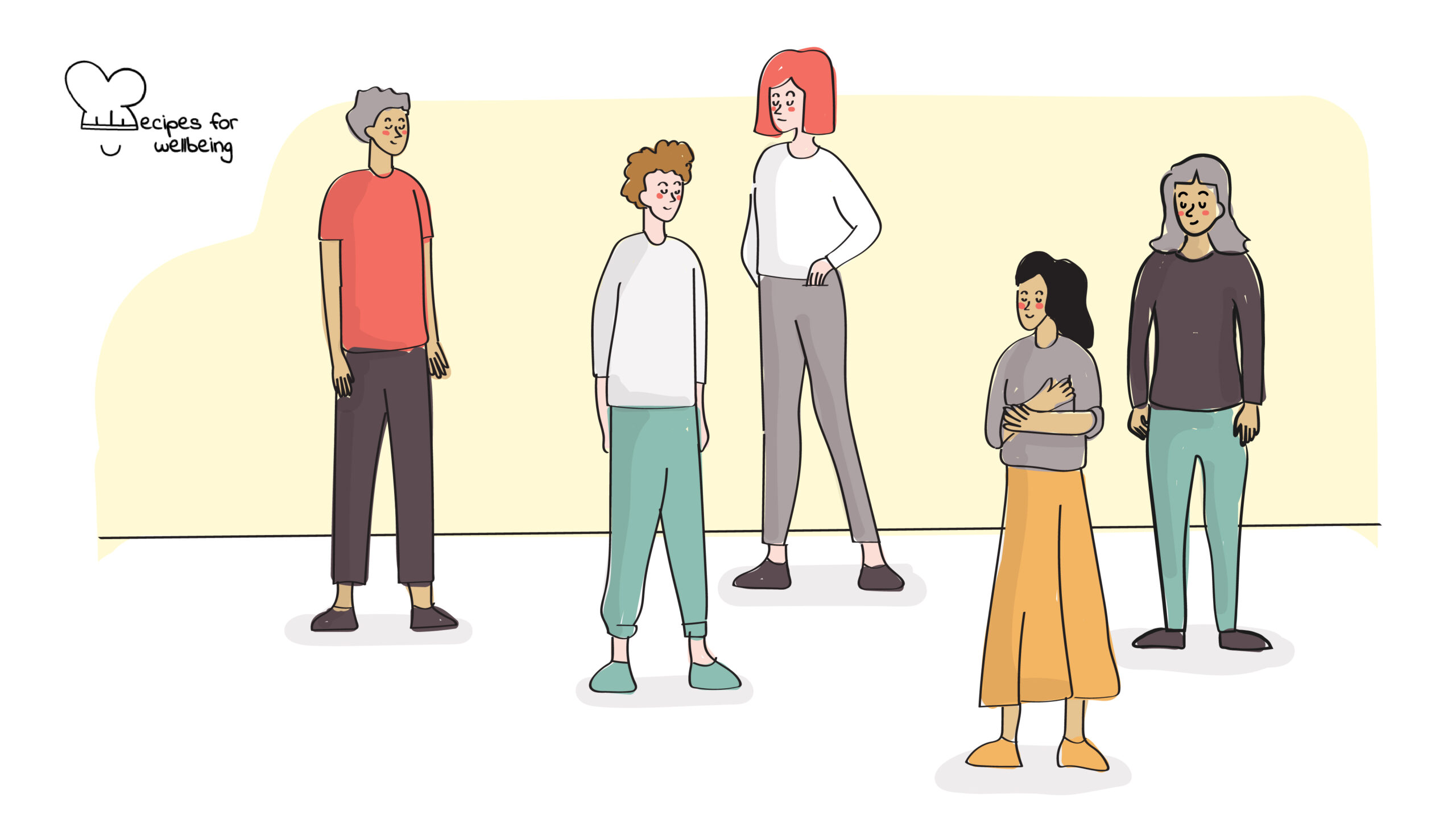
Privilege walk
What separates privilege from entitlement is gratitude. ―Brené Brown
👥 Serves: 10-50 people
🎚 Difficulty: Hard
⏳ Total time: 1 hour
🥣 Ingredients: A group of people, open space, trust, respect, non-judgment
💪 Nutritional values: Empathy, Awareness, Compassion, Tolerance, Acceptance

Privilege walk
📝 Description
A powerful activity to uncover the layers of privilege in our lives.
The privilege walk is an experiential activity to highlight how people benefit from or are marginalised by systems in our society. This is a powerful exercise to raise awareness of privilege and social justice and is an important tool to build self-acceptance and empathy towards others. This activity requires thorough facilitation, and should not be conducted carelessly or lightly. You need plenty of open space and make sure the group will not be disturbed for the duration of the activity, which consists of a walk before a reflection round. The walk is to be done with eyes closed and in silence, whereas the reflection round is to be done sitting in a circle. You will be sharing experiences and vulnerabilities with one another, so it is important that everyone contributes to creating a safe space by showing respect and listening to others. If you are looking for a slightly easier adaptation, check out our recipe “Take a step forward”.
This activity was developed by Rebecca Layne and Ryan Chiu for Dr Arthur Romano’s Conflict Resolution Pedagogy class at George Mason’s School for Conflict Analysis and Resolution.
👣 Steps
Step 1 – Setting up (5’)
Ask participants to form a straight line in the middle of the room (or with plenty of space before and behind them). You can tell them to hold hands for a moment to ensure there is an equal amount of space between them. If they are not comfortable touching or being touched, that is fine. Just make sure everyone has enough space to walk forward and backward.
Read the guidelines in the description of this activity and explain that the first part of the exercise will be done with eyes closed and in silence. Remind them that you will read statements out loud and you will invite them to move forward OR backward if the statement applies to them. If they do not feel comfortable acknowledging a statement that applies to them, tell them they can choose not to move. Nobody else will know whether it applies to them or not.
Step 2 – Walking (15’)
Read the following statements with a clear voice, pausing for a few seconds in-between:
- If you are right-handed, take one step forward.
- If English is your first language, take one step forward.
- If one or both of your parents have a college degree, take one step forward.
- If you can find plasters at mainstream stores designed to blend in with or match your skin tone, take one step forward.
- If you rely, or have relied, primarily, on public transportation, take one step back.
- If you have attended previous schools with people you felt were like yourself, take one step forward.
- If you constantly feel unsafe walking alone at night, take one step back.
- If your household employs help as gardeners, cleaners, etc., take one step forward.
- If you are able to move through the world without fear of sexual assault, take one step forward.
- If you studied the culture of your ancestors in elementary school, take one step forward.
- If you often feel that your parents are too busy to spend time with you, take one step back.
- If you were ever made fun of or bullied for something you could not change or was beyond your control, take one step back.
- If your family has ever left your homeland or entered another country not of your own free will, take one step back.
- If you would never think twice about calling the police when trouble occurs, take one step forward.
- If your family owns a computer, take one step forward.
- If you have ever been able to play a significant role in a project or activity because of a talent you gained previously, take one step forward.
- If you can show affection to your romantic partner in public without fear of ridicule or violence, take one step forward.
- If you ever had to skip a meal or were hungry because there was not enough money to buy food, take one step back.
- If you feel respected for your academic performance, take one step forward.
- If you have a physically visible disability, take one step back.
- If you have an invisible illness or disability, take one step back.
- If you were ever discouraged from an activity because of race, class, ethnicity, gender, disability, or sexual orientation, take one step back.
- If you ever tried to change your appearance, mannerisms, or behaviours to fit in more, take one step back.
- If you have ever been profiled by someone else using stereotypes, take one step back.
- If you feel good about how your identities are portrayed by the media, take one step forward.
- If you were ever accepted for something you applied to because of your association with a friend or family member, take one step forward.
- If your family has health insurance, take one step forward.
- If you have ever been spoken over because you could not articulate your thoughts fast enough, take one step back.
- If someone has ever spoken for you when you did not want them to do so, take one step back.
- If there was ever substance abuse in your household, take one step back.
- If you come from a single-parent household, take one step back.
- If you live in an area with crime and drug activity, take one step back.
- If someone in your household suffered or suffers from mental illness, take one step back.
- If you have been a victim of sexual harassment, take one step back.
- If you were ever uncomfortable about a joke related to your race, religion, ethnicity, gender, disability, or sexual orientation but felt unsafe to confront the situation, take one step back.
- If you are never asked to speak on behalf of a group of people who share an identity with you, take one step forward.
- If you can make mistakes and not have people attribute your behaviour to flaws in your racial or gender group, take one step forward.
- If you have always assumed you will go to university, take one step forward.
- If you have more than fifty books in your household, take one step forward.
- If your parents have told you that you can be anything you want to be, take one step forward.
Step 3 – Debriefing (40’)
Invite participants to open their eyes and take a moment to observe their position in the room and the position of others. After a minute or so, invite them to sit down in a circle for the debrief.
Remind them that it is normal that they might have experienced an array of intense feelings and thoughts, no matter their position. Now you will take time to debrief the activity, with two objectives: 1. to foster a deeper reflection on the participants’ experience and help them heal from negative feelings and thoughts, and 2. to allow participants to accept themselves with their privileges and marginalisation and integrate them into a harmonious whole.
Here are a few guiding questions for the debrief:
- What did you feel like being in the front of the group? In the back? In the middle?
- What were some factors that you have never thought of before?
- What question made you think most? If you could add a question, what would it be?
- What do you wish people knew about one of the identities, situations, or disadvantages that caused you to take a step back?
- How can your understanding of your privileges or marginalizations improve your existing relationships with yourself and others?

